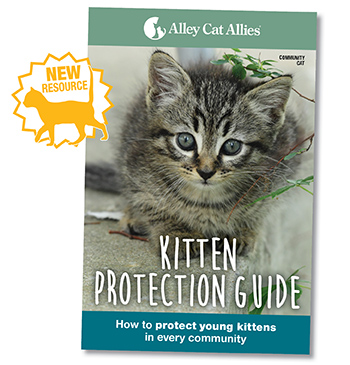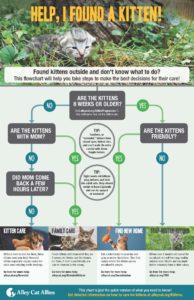What to Do if You Find Kittens Outdoors
When you discover kittens outdoors, it can be tempting to scoop them up and bring them indoors. However, it is important to know that this is rarely in a kitten’s best interest.
Leave Them BeTM
Even if you see kittens alone, it is more than likely their mother is nearby. A mother cat is kittens’ best possible caregiver, so please…Leave Them Be. This best practice involves allowing the mother cat to care for her kittens in their outdoor home. Learn more and help us spread the word at alleycat.org/LeaveThemBe.
DO NOT remove kittens younger than ~8 weeks old from their mother. It is harmful to their wellbeing.
However, are circumstances in which you may need to intervene to help young kittens. We will detail them in this resource.
Don’t Take Kittens or Their Mother to an Animal Shelter
Most shelters do not have programs to provide the care unweaned kittens need to survive and thrive. As a result, there is a risk that the kittens will be killed. Shelters in general are not good environments for mother cats and kittens. Even in the best of shelters a mother cat can become so stressed that her healthy is affected, as well as her ability to care for her kittens. The shelter environment can also be dangerous for kittens because their immune systems haven’t fully developed, and can easily catch diseases.
What To Do If You Find a Kitten
On this page, we will walk you through different scenarios for finding kittens outdoors and how to act in their best interest.
All the content below is dependent on how old a kitten is. We have a guide to determine a kitten’s age at alleycat.org/KittenProgression.
Kittens 8 Weeks Old and Older
Kittens of this age are weaned from their mother, meaning they don’t rely on her milk and are eating on their own. So, don’t hesitate: Take them to a veterinary clinic for spay or neuter!
Spaying or neutering kittens when they are 8 weeks old and at least 2 pounds is ideal for their health and wellbeing. You can learn more at alleycat.org/2Months2Pounds.
If the kittens’ mother is with them, spay her at the same time. This is critical so she does not become pregnant again. We have tips for trapping a mother cat and kittens for a Trap-Neuter-Return (TNR) program at alleycat.org/TNRKittens.
As you are preparing to spay or neuter the kittens and/or mother cat, you have a choice:
Return the kittens outdoors. Returning kittens older than 8 weeks old who have been raised by their mother outdoors to their outdoor homes as part of a TNR program is 100 percent okay! Like all cats, they will thrive. Be sure they are eartipped during their spay or neuter appointment. If a mother cat is not socialized, meaning friendly and accustomed to people, return her to her outdoor home as part of TNR as well.
OR
Foster and adopt the kittens. If you have the means, you can foster the kittens for adoption, or adopt them yourself. You can also do the same for a mother cat who is socialized. We have a guide to find the perfect adoptive home at alleycat.org/AdoptionTips.
An Important Note:
Alley Cat Allies does not, in general, recommend trying to socialize a feral cat over 4 months of age. However, there is a gray area in which the personality of the individual cat comes into play. Between 4 and 8 months of age, if there is time and capacity and if the kitten is showing meaningful signs of social behavior, the decision may be made to place the kitten in a foster home for socialization and eventual adoption.
But keep in mind that socializing is time-consuming, especially for older kittens. It involves interacting with the kittens one-on-one for at least a couple of hours every day, and results are not guaranteed. It is important to do an honest assessment of the kitten’s progress during this time. If she does not show increasing signs of socialization within a week or so, it is best that she is returned to her colony outdoors through TNR. To do otherwise is to expose the kitten to ongoing stress. Kittens will be safe and healthy in their outdoor homes with their feline families.
However, if you for any reason have brought kittens younger than 8 weeks old indoors and raised them at this most critical growth age in an indoor environment, opt to spay and neuter and adopt rather than TNR.
Kittens Younger than 8 Weeks WITH Their Mother
Leave Them Be! Kittens who are healthy and thriving with their mother outdoors do not need to be “rescued.”
Remember: Mother knows best. You cannot replace a mother cats’ instinctive care. Plus, neonatal kittens (kittens 4 weeks old and younger) need round-the-clock care to survive, which is challenging for humans to provide. These kittens are unweaned, meaning they still rely on their mother’s milk.
Why Can’t I Bring the Kittens AND Their Mother Indoors?
Even if your home is very nice, a mother cat may become so stressed by being confined in the new environment that it impacts her health and her ability to care for her kittens. Community cats thrive in their outdoor home and the mother cat has likely chosen an ideal space to raise her kittens, so there is no need to intervene.
How CAN I Help Mother Cat and Kittens While They are Outdoors?
You can’t do a mother cat’s job, but you can make her more comfortable as she cares for her kittens outdoors. Provide her with essentials like:
- Regular food and water. A nursing mother cat can always use some extra wet food so she can keep providing necessary nutrients to her kittens. Find details to care for community cats, including mother cats, at alleycat.org/BestPractices.
- An outdoor shelter. Mother cats like to raise their kittens in nests, where they feel hidden and protected. An outdoor shelter is a perfect safe space. You can purchase one or build one yourself. We have options at alleycat.org/ShelterGallery.
- Peace and quiet. Keep an eye on mother and kittens, but don’t approach or let dogs or other cats come near. Doing so will cause her stress.
What if the Kittens Are in Danger?
If a kitten is sick or injured, contact your local veterinarian right away if your kittens show these signs:
- Signs of a sick kitten include:
- Thin stomachs and gaunt faces, visible ribs and spine
- Cold ears, bellies, and paws
- Pale gums and tongue
- Lethargy/almost no movement
- Excessively crusted eyes or nose
- Diarrhea or vomiting
- Struggling to breathe
Signs of an injured kitten include:
- Limping
- Visible wounds or sores
- Crying out in pain
There may be rare circumstances in which the kittens’ current environment places them in immediate danger. This is not a common scenario, so use common sense. For example, kittens may need to be removed if they are in an area that is about to be flooded or is close to a fire.
If possible, move the kittens to another outdoor spot as close to their original nest as is safe so their mother can find them.
If you believe mother and kittens are in more long-term danger, such as extreme weather or disaster conditions…
- Bring the whole family inside to a quiet, small room (like a bathroom). You can also use a large dog crate, covered with a blanket.
- Provide the mother cat and kittens with a carrier as a hiding place. Provide food and water, and a litter box placed as far away from the sleeping and eating area as possible.
Once Kittens are 8 Weeks Old: Spay or Neuter
If kittens have been raised indoors at their most critical growth ages before 8 weeks of age, do not return them outdoors. Spay and neuter the kittens at 8 weeks old and find them adoptive homes.
The mother cat, however, can be spayed and returned to her outdoor home through a TNR program.
Kittens Younger than 8 Weeks WITHOUT Their Mother
First and foremost: Do not assume that a kittens are abandoned or orphaned just because you do not see their mother. A mother cat will temporarily leave her kittens for good reasons, like looking for food. She may even be hiding and waiting for YOU to leave.
Wait and Watch
Always wait several hours, or even a full day to see if a mother cat returns. Watch from a hidden spot or from inside so you don’t scare the mother cat away. Your presence may keep her from returning to her kittens’ nest.
Even if you don’t see the mother cat for a long time, check on the kittens periodically. If they are cuddled together and sleeping quietly, look pink, warm, and clean, and have full bellies, then their mother has very likely been back. You just didn’t notice. Community cats are good at staying out of sight when they want!
A Helpful Tip
Sprinkle flour near the kittens’ nest. If the mother cat returns, she will leave paw prints.
If you have waited for several hours or more than a day and have reason to believe the kittens’ mother is no longer around, step in to help them. Neonatal kittens (kittens 4 weeks old and younger) will need special supplies and round-the-clock care to survive.
Can You Care for the Kittens Yourself?
If you have the time and means, you can do so in your home. Alley Cat Allies has a guide and webinar to help at alleycat.org/Neonatal and a list of supplies you’ll need at alleycat.org/KittenCareKit.
If your local animal shelter has a Wait Until 8® program or something similar, it can help. In a Wait Until 8 program, shelters empower good Samaritans who find kittens to care for those kittens at home. The shelter provides tools and instructions, like kitten care kits, to ensure a kitten’s caregiver has everything they need.
Call or visit and ask your local shelter if they have this program in place. If not, we encourage you to ask your shelter leaders to adopt the program. Learn more at alleycat.org/WaitUntil8.
Unable to care for the kittens yourself?
Do NOT take the kittens to an animal shelter. See if a friend or family member can care for them, or contact local rescues, animal protection groups, or advocates. You may be able to find such advocates near you through Alley Cat Allies Community Resource Tool. Find resources in your area at gethelp.alleycat.org
Once Kittens are 8 Weeks Old: Spay or Neuter
If kittens have been indoors at their most critical growth ages before 8 weeks of age, do not return them outdoors. They will not have developed the skills to live as a community cat if they were raised away from their mother outside of their outdoor environment. Spay and neuter the kittens at 8 weeks old and find them adoptive homes.



